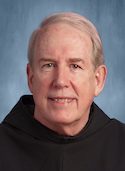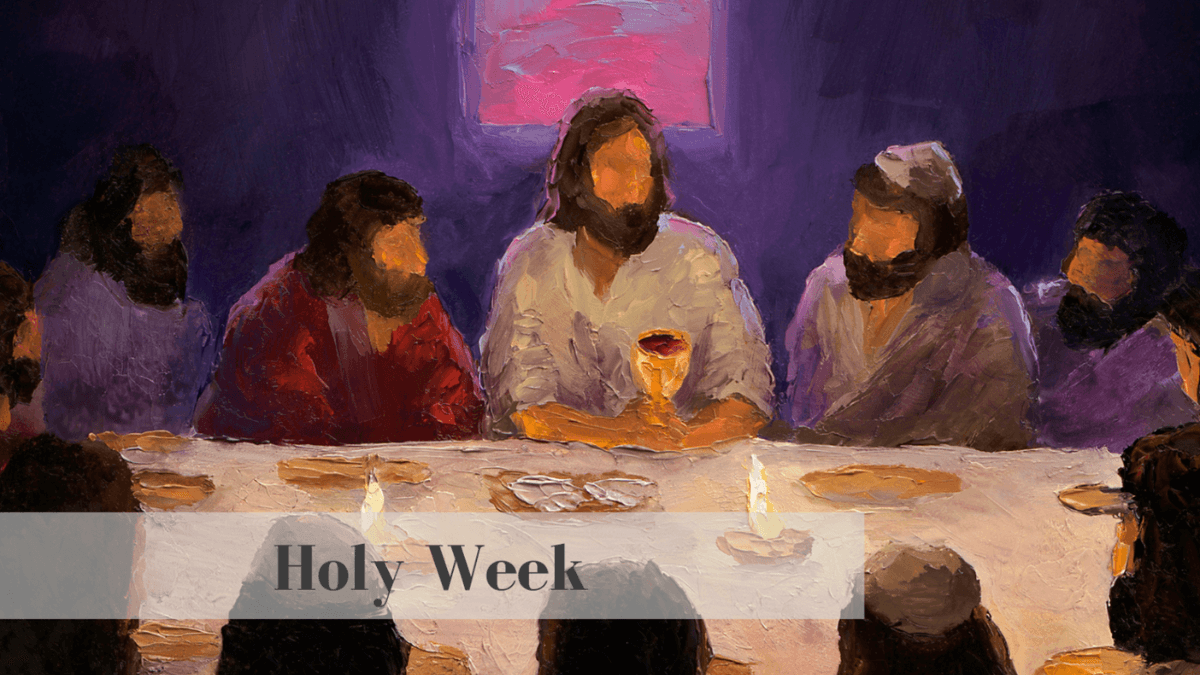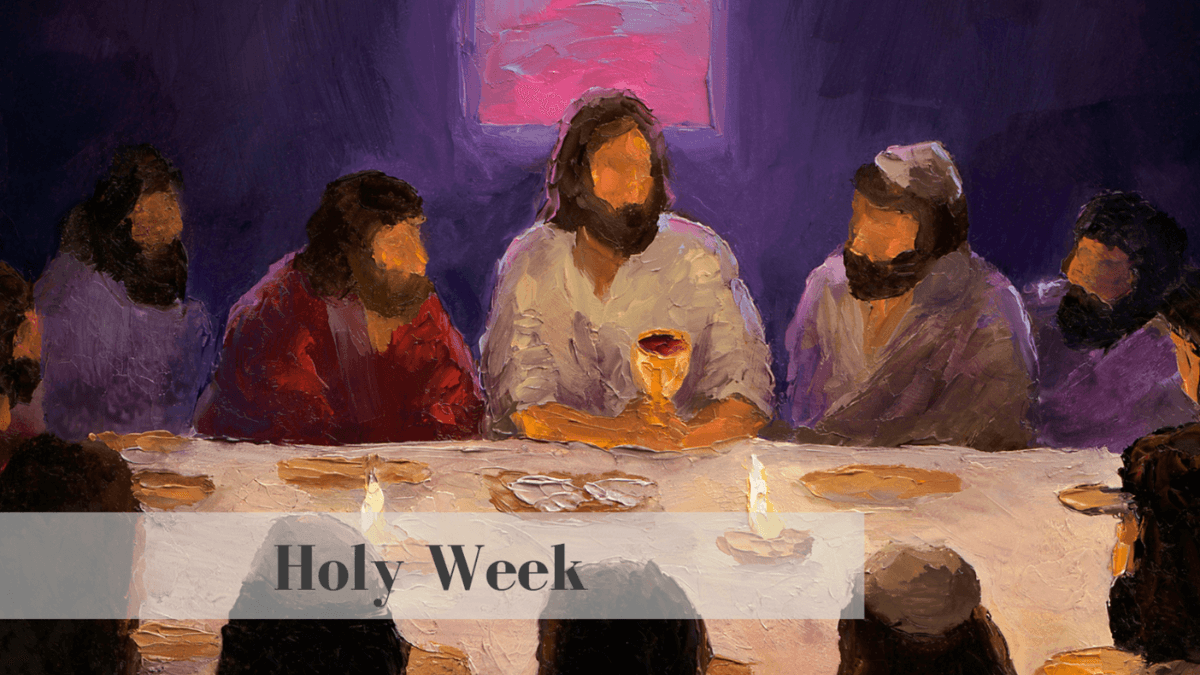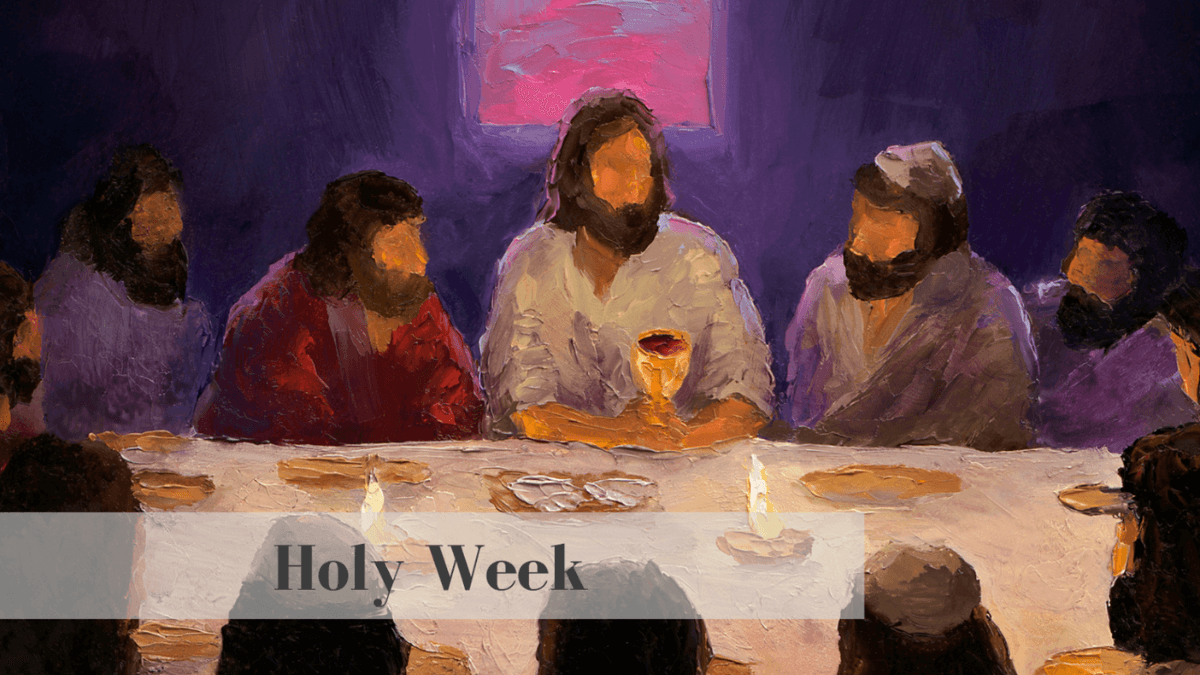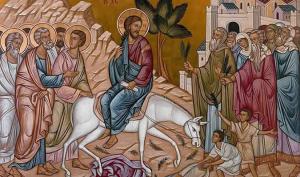Featured
Videos


SOURCE: A Word Proclaimed
The Gospel of Mark on Palm Sunday highlights the contrast between treachery and devotion, emphasizing the importance of caring for the poor and the significance of vigilance and prayer in the face of betrayal and agony.
- 00:00 🌿 The Gospel of Mark on Palm Sunday shows the unadorned truth of God’s love for us.
- 01:18 🌿 We weep with grief and see our sins through the eyes of Jesus’ mercy, as the narrative in Mark presents a contrast between treachery and devotion.
- 03:17 🌿 A woman anoints Jesus with expensive oil, emphasizing that giving one’s life to the Lord is not a waste.
- A woman brought an expensive jar of perfumed oil, worth hundreds of dollars, to an event.
- A woman anoints Jesus with a jar of expensive oil, and despite criticism, the speaker argues that giving one’s life to the Lord is not a waste.
- 06:02 💰 Give money to the poor instead of spending it on expensive things, and the economy will stay stable.
- 07:04 📖 Jesus defends a woman’s actions, stating that she has done a good work for him, and quotes Deuteronomy about always having the poor with you.
- 09:02 🌿 Jesus emphasizes the importance of caring for the poor and predicts his own death, while Judas plans to betray him.
- 10:42 🌿 Jesus discusses his betrayal and agony in the garden in relation to the Eucharist, warning his disciples that their faith will be shaken.
- The betrayal of Jesus and the agony in the garden are discussed in relation to the Eucharist.
- Jesus tells his disciples that they will all have their faith shaken, quoting Zechariah, and Peter insists that even if all are shaken, he will not be.
- 13:26 🌿 Jesus emphasizes the importance of vigilance and prayer as he prepares to be handed over to sinners according to God’s will.
- Peter takes Peter, James, and John to pray with him, but they fall asleep, highlighting the challenge of being a leader and the importance of staying vigilant.
- Jesus tells his disciples to watch and pray, as he is about to be handed over to sinners, and he resolves to go through with it according to God’s will.

SOURCE: A Walk in the Word
Palm Sunday marks the triumphant entry of Jesus into Jerusalem, fulfilling Old Testament prophecies and symbolizing his identity as the true son of David and the Prince of Peace.
- 00:00 🌿 Palm Sunday marks the start of Holy Week in the Catholic Church, with a unique liturgy involving the blessing of palms and the proclamation of the First Gospel about Jesus’s triumphal entry into Jerusalem.
- 11:50 🌿 Jesus prepares for his royal entrance into Jerusalem as the prophesied Messianic figure, instructing his disciples to find a colt for his entry.
- 16:55 🌿 Jesus orchestrates his triumphal entry into Jerusalem in a sovereign and deliberate manner, symbolizing his identity as the true son of David and the Prince of Peace.
- 24:26 🌿 Jesus fulfills Old Testament prophecies by riding into Jerusalem on a donkey, as the people express jubilation and humility by laying down their garments and worshiping him.
- 34:23 🌿 Jesus’s royal entry into Jerusalem on Palm Sunday fulfills biblical prophecy, foreshadows his crucifixion and reign as king, and is recognized by the people as the new Solomon.
- 41:59 🌿 Jesus fulfills Old Testament prophecies by riding into Jerusalem on a mule, rooted in Ezekiel, pointing to the fact that Jesus is the Lord and he returns by way of the Mount of Olives and enters through the Eastern Gate, corresponding to Old Testament prophecies.
- 50:44 🌿 Open your hearts and prepare to receive the King of Glory with lifted spirits and penitent souls during Holy Week.
- 56:32 🌿 Share and support the podcast for blessings and spiritual nourishment.

SOURCE: Hearers of the Word
Holy Week and Easter are a time to reflect on the healing and salvation brought by Jesus’ death and resurrection, emphasizing the need for a new way to talk about salvation and the significance of love, humility, and healing in the gospel of John.
- 00:00 📅 Kieran O’Mahony discusses the therapeutic and healing metaphor of Holy Week and Easter 2021, focusing on the readings and the significance of the celebration.
- Kieran O’Mahony, a biblical scholar, discusses the celebration of Holy Week and Easter 2021, focusing on the readings and the significance of the celebration.
- The traditional understanding of Holy Week and Easter needs to be replaced with a therapeutic and healing metaphor found in the gospel of John, offering a strong alternative that is enriching, challenging, loving, and joyful.
- The program discusses the celebration of Holy Week and Easter in 2021, including prayers, comments on Irish and Western church traditions, the fourth gospel, and the need for healing, with a focus on the lifting up as a healing metaphor.
- 03:37 🐣 Despite pandemic restrictions, individuals are challenged to live through Holy Week and Easter, reflecting on the significance of traditions and the connection between Easter and Christmas.
- Despite the ongoing pandemic and restrictions, individuals are challenged to recreate and live through the great events of Holy Week and Easter, prompting reflection on the reasons for celebration and the significance of the traditions.
- Easter is often overshadowed by Christmas culturally, but without Easter, Christmas would not make sense, and the bias towards Good Friday over Easter Sunday is based on a wider devotional tradition in the Western church.
- Adam’s sin affected all of his descendants, and Jesus’ death on the cross was the payment for redemption, but this traditional narrative presents difficulties today.
- Redemption through the death of Jesus is achieved by paying the price of punishment, but the resurrection has no place in the devotional tradition and lacks connection with Jesus’ life and ministry.
- 09:36 🌟 The speaker discusses integrating evolution and new cosmology into theology, emphasizing the need for a new way to talk about salvation and focusing on the gospel of John during Holy Week and Easter.
- The speaker discusses the integration of evolution and new cosmology into theology and understanding of God and Christ.
- The traditional narrative of redemption through punishment on the cross no longer works, and there is a need to find a new way to talk about the events that brought salvation, with a focus on the gospel of John.
- God’s loving therapy and new creation, enacted by the Holy Spirit, is explored through the significance of the fourth gospel in Holy Week, the Triduum, and Easter Sunday.
- 13:44 🌿 The saving events of new life in Christ are presented in John’s gospel through healing, love, and service, with a focus on the need for healing in the world, particularly against violence towards women.
- John’s gospel presents the saving events of new life in Christ under three headings of healing, love, and service, with the wider reception described as passover for Jews and new creation for all of humanity, and the enactment of salvation in believers’ lives through the gift and indwelling of the Holy Spirit.
- The speaker plans to explore the therapeutic metaphor of lifting up in the fourth gospel, acknowledging the need for healing in different aspects of life.
- The world is currently experiencing a lot of violence, particularly against women, and there is a need for healing and responsibility for the next generation and the earth.
- 18:13 🙏 Jesus’ death and resurrection bring healing from death, as seen in the metaphor of lifting up in John chapter 3, referencing Moses, the book of Numbers, and the suffering servant songs in Isaiah.
- Jesus’ death and resurrection offer healing from the great conundrum of death, as seen in the metaphor of lifting up in John chapter 3.
- The focus is on the lifting up of the bronze serpent in John’s gospel, with background references to Moses, the book of Numbers, and the suffering servant songs in Isaiah, and the expression “the son of man must be lifted up” is found four times in the gospel.
- Jesus speaks about being lifted up, which refers to his physical crucifixion and spiritual journey into resurrection, combining the events as one in the Gospel of John.
- The people spoke against God and Moses, so the Lord sent venomous snakes, but when the people repented, Moses prayed for them.
- Moses made a bronze snake on a pole as a symbol of rebirth and healing, representing the therapeutic event of being able to look at past harm and be set free, which is foundational for the fourth gospel’s understanding of salvation.
- The language of the lifting up in the fourth gospel is influenced by the story of Moses and the bronze serpent, as well as the four suffering servant songs from Isaiah, which are also part of the essential structure of Holy Week liturgy.
- 26:37 🌟 Jesus is the chosen one to bring deliverance to the world, and he is the light of the world as prophesied by the high priest and affirmed in the Gospel of John and Isaiah.
- The chosen one, supported by God, will make just decrees for the nations and bring deliverance to the remotest regions of the earth.
- The high priest prophesied that Jesus would die for the Jewish nation and gather the children of God, and there are affirmations about Jesus as the light of the world.
- Jesus is the light of the world, and the references to light in the Gospel of John and the suffering servant song in Isaiah are significant.
- 30:44 🙏 Jesus’ crucifixion and resurrection are discussed in relation to the significance of the suffering servant song in John’s gospel, emphasizing love, humility, and salvation.
- The language of being lifted up and the significance of the suffering servant song in John’s gospel is discussed in relation to Jesus’ crucifixion and resurrection.
- The fourth gospel’s understanding of salvation is linked to the traditional language of the suffering servant, permeating all three ways of talking about salvation.
- The washing of the feet and the death of Jesus both illustrate the inner meaning of Jesus’ death and resurrection as an act of loving service to humanity.
- Jesus demonstrates love and humility by washing his disciples’ feet before his crucifixion, and fulfills scripture by saying “I am thirsty” and “It is completed” before giving up his spirit.
- 36:07 🙏 Jesus’ loving service and completion of his mission through his death and resurrection is celebrated in Holy Week and Easter, emphasizing salvation and healing love in the gospel of John.
- Jesus knew it was time to depart from the world, and he loved his own to the very end, as shown in the story of the washing of the feet.
- Jesus’ use of the word “tetelestai” from chapter 13 signifies the completion of his mission, referencing the passover feast and fulfilling scripture before giving up his spirit.
- The gospel of John explores the saving events using the language of healing, lifting up, love, and service, all belonging together as acts of salvation for both the Jews and all of humanity.
- The fourth gospel teaches that salvation is achieved through the gift of the holy spirit, setting humanity free from death and sin, and is a new passover and creation enacted by the holy spirit.
- God’s love reaches humanity in our need, offering deep healing, celebrated in Holy Week and Easter, with a focus on the suffering servant songs and the fourth gospel.
- The speaker discusses the significance of Jesus’ death and resurrection as an act of loving service, emphasizing the idea of serving love, healing love, and faithful love in John’s gospel.

SOURCE: The Mass Readings Explained
Jesus’ betrayal by Judas parallels Joseph’s betrayal by Judah, and just as Joseph saved his brothers, Jesus would later save his betrayers, symbolized by the gift of the Eucharist.
- 00:00 💡 Jesus and the Jewish Roots of Holy Week: Judas betrayed Jesus for money, stealing from the poor.
- 00:18 💡 Jesus was betrayed for 30 pieces of silver, the price of a slave, making him seem cheap.
- 01:02 💡 Jesus’ betrayal by Judas parallels Joseph’s betrayal by Judah in the book of Genesis.
- 01:36 📜 Joseph’s brothers decide to sell him to the Ishmaelites instead of killing him, leading to his journey to Egypt.
- 02:35 💡 Jesus and Joseph were both sold by Judas and Judah, but just as Joseph saved his brothers, Jesus would later save his betrayers.
- 03:26 🌾 Joseph, sold into slavery, saves his brothers and all Gentiles by storing wheat during famine.
- 03:59 🍞 Joseph is a type of Christ, betrayed by Judas, but through this betrayal, He will save the entire world with the gift of the Eucharist.
- 04:30 🔍 7 is not the number of perfection, it is the Alliance number, and 10 is the number of perfection, just as Joseph saved with wheat, Christ will save with the bread of the Eucharist, the New Covenant.
Commentary
Highlights

Fr. George
Corrigan
OFM
Fr. Corrigan, OFM

Commentaries are arranged by Liturgical Year B order.
You are free to download and use for Bible Study, to evangelize, or anything that gives Glory to God. Enjoy.” — Fr. Corrigan
Michal E.
Hunt
Agape Bible Commentary
Palm Sunday B
God’s Servant is Christ the King Who Raises Us from Death to Life
The prophecy of Psalm 22:1 begins with Jesus’ fourth statement from the Cross: “My God, my God, why have you forsaken me?” (quoted in Hebrew in Mt 27:46 with a Greek translation and Mk 15:34 in Aramaic). Psalm 22:8-9 and 17-20 describes Jesus’ abuse by His enemies and the physical agony of His crucifixion. The Gospel Reading repeats the abuse we read in the First Reading and Psalm 22. Jesus calls out verse 1 from Psalm 22 from the Cross (Mk 15:34).
Michal E Hunt, Copyright © 2014; revised 2023 Agape Bible Study; used with permission
Catena
Aurea

Compiled by
St. Thomas
Aquinas
Catena Aurea
Thomas Aquinas compiled this opus from sermons and commentaries on the Gospels written by the early Church Fathers, arranging their thoughts in such a way that they form a continuous commentary on each Gospel.
Mark 11:1-10
1. And when they came nigh to Jerusalem, unto Bethphage and Bethany, at the mount of Olives, he sendeth forth two of his disciples,
2. And saith unto them, Go your way into the village over against you: and as soon as ye be entered into it, ye shall find a colt tied, whereon never man sat; loose him, and bring him.
3. And if any man say unto you, Why do ye this? say ye that the Lord hath need of him; and straightway he will send him hither.
4. And they went their way, and found the colt tied by the door without in a place where two ways met; and they loose him.
5. And certain of them that stood there said unto them, What do ye, loosing the colt?
6. And they said unto them even as Jesus had commanded: and they let them go.
7. And they brought the colt to Jesus, and cast their garments on him; and he sat upon him.
8. And many spread their garments in the way: and others cut down branches off the trees, and strawed them in the way.
9. And they that went before, and they that followed, cried, saying, Hosanna; Blessed is he that cometh in the name of the Lord:
10. Blessed be the kingdom of our father David, that cometh in the name of the Lord: Hosanna in the highest.
CHRYSOSTOM. (ubi sup.) Now that the Lord had given sufficient proof of His virtue, and the cross was at hand, even at the door, He did those things which were about to excite them against Him with a greater openness; therefore although He had so often gone up to Jerusalem, He never however had done so in such a conspicuous manner as now.
THEOPHYLACT. That thus, if they were willing, they might recognise His glory, and by the prophecies, which were fulfilled concerning Him, know that He is very God; and that if they would not, they might receive a greater judgment, for not having believed so many wonderful miracles. Describing therefore this illustrious entrance, the Evangelist says, And when they came nigh unto Jerusalem, and Bethany, at the mount of Olives, he sendeth forth two of his disciples.
BEDE. (in Marc. 3, 41) Bethany is a little village or town by the side of mount Olivet, where Lazarus was raised from the dead. But in what way He sent His disciples and for what purpose is shewn in these words, And saith unto them, Go your way into the village over against you.
THEOPHYLACT. Now consider how many things the Lord foretold to His disciples, that they should find a colt; wherefore it goes on, And as soon as ye be entered into it, ye shall find a colt tied, whereon never man sat, loose him, and bring him; and that they should be impeded in taking it, wherefore there follows, And if any man say unto you, Why do ye this? say ye, The Lord hath need of him; and that on saying this, they should be allowed to take him; wherefore there follows, And straightway he will send him hither; and as the Lord had said, so it was fulfilled. Thus it goes on: And they went their way, and found the colt tied by the door without, in a place where two ways meet; and they loose him.
AUGUSTINE. (de Con. Ev. ii. 66) Matthew says, an ass and a colt, the rest however do not mention the ass. Where then both may be the case, there is no disagreement, though one Evangelist mentions one thing, and a second mentions another; how much less should a question be raised, when one mentions one, and another mentions that same one and another. It goes on: And certain of them that stood there said unto them, What do ye, loosing the colt? And they said unto them even as Jesus had commanded, and they let them take it, that is, the colt.
THEOPHYLACT. But they would not have allowed this, if the Divine power had not been upon them, to compel them, especially, as they were country people and farmers, and yet allowed them to take away the colt. It goes on: And they brought the colt to Jesus, and cast their garments on him; and he sat upon him.
PSEUDO-CHRYSOSTOM. (Cat. in Marc. Oxon.) Not indeed that He was compelled by necessity to ride on a colt from the mount of Olives to Jerusalem, for He had gone over Judæa and all Galilee on foot, but this action of His is typical. It goes on: And many spread their garments in the way: that is, under the feet of the colt; and others cut down branches off the trees, and strawed them in the way. 1This, however, was rather done to honour Him, and as a Sacrament, than of necessity. It goes on: And they that went before, and they that followed, cried, saying, Hosanna; blessed is he that cometh in the name of the Lord. 2For the multitude, until it was corrupted, knew what was its duty, for which reason each honoured Jesus according to his own strength. Wherefore they praised Him, and took up the hymns of the Levites, saying, Hosanna, which according to some is the same as save me, but according to others means a hymn. I however suppose the former to be more probable, for there is in the 117th Psalm, (Ps. 118:25) Save now, I beseech thee, O Lord, which in the Hebrew is Hosanna.
BEDE. (ubi sup.) But Hosanna is a Hebrew word, made out of two, one imperfect the other perfect. For save, or preserve, is in their language, hosy; but anna is a supplicatory interjection, as in Latin heu is an exclamation of grief.
PSEUDO-JEROME. They cry out Hosanna, that is save us, that men might be saved by Him who was blessed, and was a conqueror and came in the name of the Lord, that is, of His Father, since the Father is so called because of the Son, and the Son, because of the Father.
PSEUDO-CHRYSOSTOM. (Cat. in Marc. Oxon.) Thus then they give glory to God, saying, Blessed is he that cometh in the name of the Lord. They also bless the kingdom of Christ, saying, Blessed be the kingdom of our father David, which cometh.
THEOPHYLACT. But they called the kingdom of Christ, that of David, both because Christ was descended from the seed of David, and because David means a man of a strong hand. For whose hand is stronger than the Lord’s, by which so many and so great miracles were wrought.
PSEUDO-CHRYSOSTOM. (Cat. in Marc. Oxon.) Wherefore also the prophets so often call Christ by the name of David, on account of the descent according to the flesh of Christ from David.
BEDE. (ubi sup.) Now we read in the Gospel of John that He fled into a mountain, lest they should make him their king. Now, however, when He comes to Jerusalem to suffer, He does not shun those who call Him king, that He might openly teach them that He was King over an empire not temporal and earthly, but everlasting in the heavens, and that the path to this kingdom was through contempt of death. Observe also the agreement of the multitude with the saying of Gabriel, The Lord God will give him the throne of his father David; (Luke 1:32) that is, that He Himself may call by word and deed to a heavenly kingdom the nation to which David once furnished the government of a temporal rule.
PSEUDO-CHRYSOSTOM. (Cat. in Marc. Oxon.) And further, they give glory to God, when they add Hosanna in the highest, that is, praise and glory be to the God of all, Who is in the highest.
PSEUDO-JEROME. Or Hosanna, that is, save in the highest as well as in the lowest, that is, that the just be built on the ruin of Angels, and also that both those on the earth and those under the earth should be saved. In a mystical sense, also, the Lord approaches Jerusalem, which is ‘the vision of peace,’ in which happiness remains fixed and unmoved, being, as the Apostle says, the mother of all believers. (Gal. 4:26)
BEDE. (ubi sup.) Bethany again means the house of obedience, because by teaching many before His Passion, he made for Himself a house of obedience; and it is said to be placed on the mount of Olives, because He cherishes His Church with the unction of spiritual gifts, and with the light of piety and knowledge. But He sent His disciples to a hold1, which was over against them, that is, He appointed doctors to penetrate into the ignorant parts of the whole world, into, as it were, the walls of the hold placed against them.
PSEUDO-JEROME. The disciples of Christ are called two by two, and sent two by two, since charity implies more than one, as it is written, Woe to him that is alone. (Eccl. 4:10) Two persons lead the Israelites out of Egypt: two bring down the bunch of grapes from the Holy Land, that men in authority might ever join together activity and knowledge, and bring forward two commandments from the Two Tables, and be washed from two fountains, and carry the ark of the Lord on two poles, and know the Lord between the two Cherubim, and sing to Him with both mind and spirit.
THEOPHYLACT. The colt, however, was not necessary to Him, but He sent for it to shew that He would transfer Himself to the Gentiles.
BEDE. (ubi sup.) For the colt of the ass, wanton and unshackled, denotes the people of the nations, on whom no man had yet sat, because no wise doctor had, by teaching them the things of salvation, put upon them the bridle of correction, to oblige them to restrain their tongues from evil, or to compel them into the narrow path of life.
PSEUDO-JEROME. But they found the colt tied by the door without, because the Gentile people were bound by the chain of their sins before the door of faith, that is, without the Church.
AMBROSE. (in Luc. 9, 6) Or else, they found it bound before the door, because whosoever is not in Christ is without, in the way; but he who is in Christ, is not without. He has added in the way, or in a place where two ways meet, where there is no certain possession for any man, nor stall, nor food, nor stable; miserable is his service, whose rights are unfixed; for he who has not the one Master, has many. Strangers bind him that they may possess him, Christ looses him in order to keep him, for He knows that gifts are stronger ties than bonds.
BEDE. (ubi sup.) Or else, fitly did the colt stand in a place where two ways meet, because the Gentile people did not hold on in any certain road of life and faith, but followed in its error many doubtful paths of various sects.
PSEUDO-JEROME. Or, in a place where two roads meet, that is, in the freedom of will, hesitating between life and death.
THEOPHYLACT. Or else, in a place where two roads meet, that is, in this life, but it was loosed by the disciples, through faith and baptism.
PSEUDO-JEROME. But some said, What do ye? as if they would say, Who can remit sins?
THEOPHYLACT. Or else, those who prevent them are the devils, who were weaker than the Apostles.
BEDE. (ubi sup.) Or else, the masters of error, who resisted the teachers, when they came to save the Gentiles; but after that the power of the faith of the Lord appeared to believers, the faithful people were freed from the cavils of the adversaries, and were brought to the Lord, whom they bore in their hearts. But by the garments of the Apostles, which they put upon it, we may understand the teaching of virtues, or the interpretation of the Scriptures, or the various doctrines of the Church, by which they clothe the hearts of men, once naked and cold and fit them to become the seats of Christ.
PSEUDO-JEROME. Or else, they put upon it their garments, that is, they bring to them the first robe of immortality by the Sacrament of Baptism. And Jesus sat upon it, that is, began to reign in them, so that sin should not reign in their wanton flesh, but righteousness, and peace, and joy in the Holy Ghost. Again, many spread their garments in the way, under the feet of the foal of the ass. What are feet, but those who carry, and the least esteemed, whom the Apostle has set to judge? (v. 1 Cor. 6:4.) And these too, though they are not the back on which the Lord sat, yet are instructed by John with the soldiers.
BEDE. (ubi sup.) Or else, many strew their garments in the way, because the holy martyrs put off from themselves the garment of their own flesh, and prepare a way for the more simple servants of God with their own blood. Many also strew their garments in the way, because they tame their bodies with abstinence, that they may prepare a way for God to the mount, or may give good examples to those who follow them. And they cut down branches from the trees, who in the teaching of the truth cull the sentences of the Fathers from their words, and by their lowly preaching scatter them in the path of God, when He comes into the soul of the hearer.
THEOPHYLACT. Let us also strew the way of our life with branches which we cut from the trees, that is, imitate the saints, for these are holy trees, from which, he who imitates their virtues cuts down branches.
PSEUDO-JEROME. For the righteous shall flourish as a palm tree, straitened in their roots, but spreading out wide with flowers and fruits; for they are a good odour unto Christ, and strew the way of the commandments of God with their good report. Those who went before are the prophets, and those who followed are the Apostles.
BEDE. (ubi sup.) And because all the elect, whether those who were able to become such in Judæa, or those who now are such in the Church, believed and now believe on the Mediator between God and man, both those who go before and those who follow cried out Hosanna.
THEOPHYLACT. But both those of our deeds which go before and those which follow after must be done to the glory of God; for some in their past life make a good beginning, but their following life does not correspond with their former, neither does it end to the glory of God.
John 12:27–33
27. Now is my soul troubled; and what shall I say? Father, save me from this hour: but for this cause came I unto this hour.
28. Father, glorify thy name. Then came there a voice from heaven, saying, I have both glorified it, and will glorify it again.
29. The people therefore, that stood by, and heard it, said that it thundered: others said, An angel spake to him.
30. Jesus answered and said, This voice came not because of me, but for your sakes.
31. Now is the judgment of this world: now shall the prince of this world be cast out.
32. And I, if I be lifted up from the earth, will draw all men unto me.
33. This he said, signifying what death he should die.
CHRYSOSTOM. (Hom. lxvi) To our Lord’s exhortation to His disciples to endurance, they might have replied that it was easy for Him, Who was out of the reach of human pain, to talk philosophically about death, and to recommend others to bear what He is in no danger of having to bear Himself. So He lets them see that He is Himself in an agony, but that He does not intend to decline death, merely for the sake of relieving Himself: Now is My soul troubled.
AUGUSTINE. (Tr. lii. 2) I hear Him say, He that hateth his life in this world, shall keep it unto life eternal; and I am ravished, I despise the world; the whole of this life, however long, is but a vapour in My sight; all temporal things are vile, in comparison with eternal. And again I hear Him say, Now is My soul troubled. Thou biddest my soul follow Thee; but I see Thy soul troubled. What foundation shall I seek, if the Rock gives way? Lord, I acknowledge Thy mercy. Thou of Thy love wast of Thine own will troubled, to console those who are troubled through the infirmity of nature; that the members of Thy body perish not in despair. The Head took upon Himself the affections of His members. He was not troubled by any thing, but, as was said above, He troubled Himself. (c. 11:33)
CHRYSOSTOM. (Hom. lxvii) As He draws near to the Cross, His human nature appears, a nature that did not wish to die, but cleaved to this present life. He shews that He is not quite without human feelings. For the desire of this present life is not necessarily wrong, any more than hunger. Christ had a body free from sin, but not from natural infirmities. But these attach solely to the dispensation of His humanity, not to His divinity.
AUGUSTINE. (Tr. lii) Lastly, let the man who would follow Him, hear at what hour he should follow. A fearful hour has perhaps come: a choice is offered, either to do wrong, or suffer: the weak soul is troubled. Hear our Lord. What shall I say?
BEDE. i. e. What but something to confirm My followers? Father, save Me from this hour.
AUGUSTINE. (Tr. lii. 3) He teaches thee Whom thou shouldest call on, whose will prefer to thine own. Let Him not seem to fall from His greatness, because He wishes thee to rise from thy meanness. He took upon Him man’s infirmity, that He might teach the afflicted to say, Not what I will, but what Thou wilt. Wherefore He adds, But for this cause came I unto this hour. Father, glorify Thy name: i. e. in My passion and resurrection.
CHRYSOSTOM. (Hom. lxvii. 2) As if He said, I cannot say why I should ask to be saved from it; For for this cause came I unto this hour. However ye may be troubled and dejected at the thought of dying, do not run away from death. I am troubled, yet I ask not to be spared. I do not say, Save Me from this hour, but the contrary, Glorify Thy name. To die for the truth was to glorify God, as the event shewed; for after His crucifixion the whole world was to be converted to the knowledge and worship of God, both the Father and the Son. But this He is silent about.
Then came there a voice from heaven, saying, I have both glorified it, and will glorify it again.
GREGORY. (Moral. xxviii.) When God speaks audibly, as He does here, but no visible appearance is seen, He speaks through the medium of a rational creature: i. e. by the voice of an Angel.
AUGUSTINE. (Tr. lii. 4) I have glorified it, i. e. before I made the world; and will glorify it again, i. e. when Thou shalt rise from the dead. Or, I have glorified it, when Thou wast born of a Virgin, didst work miracles, wast made manifest by the Holy Ghost descending in the shape of a dove; and will glorify it again, when Thou shalt rise from the dead, and, as God, be exalted above the heavens, and Thy glory above all the earth.
The people therefore that stood by and heard it, said that it thundered.
CHRYSOSTOM. (Hom. lxvii. 2) The voice though loud and distinct, soon passed off from their gross, carnal, and sluggish minds; only the sound remaining. Others perceived an articulate voice, but did not catch what it said: Others said, An Angel spake to Him.
Jesus answered and said, This voice came not because of Me, but for your sakes.
AUGUSTINE. (Tr. lii. 5) i. e. It did not come to tell Him what He knew already, but them what they ought to know. And as that voice did not come for His sake, but for theirs, so His soul was not troubled for His sake, but for theirs.
CHRYSOSTOM. (Hom. lxvii. 2) The voice of the Father proved what they were so fond of denying, that He was from God. For He must be from God, if He was glorified by God. It was not that He needed encouragement of such a voice Himself, but He condescended to receive it for the sake of those who were by. Now is the judgment of this world: this fits on to the preceding, as shewing the mode of His being glorified.
AUGUSTINE. (Tr. lii. 6) The judgment at the end of the world will be of eternal rewards and punishments. But there is another judgment, not of condemnation, but of selection, which is the one meant here; the selection of His own redeemed, and their deliverance from the power of the devil: Now shall the prince of this world be cast out. The devil is not called the prince of this world, in the sense of being lord over heaven and earth; God forbid. The world here stands for the wicked dispersed over all the world. In this sense the devil is the prince of the world, i. e. of all the wicked men who live in the world. The world also sometimes stands for the good dispersed throughout the world: God was in Christ reconciling the world unto Himself. (2 Cor. 5:19) These are they from whose hearts the prince of this world shall be cast out. Our Lord foresaw that after His passion and glorifying, great nations all over the world would be converted, in whom the devil was then, but from whose hearts, on their truly renouncing him1, he would be cast out. But was he not cast out of the hearts of righteous men of old? Why is it, Now shall be cast out? Because that which once took place in a very few persons, was now to take place in whole nations. What then, does the devil not tempt at all the minds of believers? Yea, he never ceases to tempt them. But it is one thing to reign within, another to lay siege from without.
CHRYSOSTOM. (Hom. lxvii. 2) What kind of judgment it is by which the devil is cast out, I will explain by an example. A man demands payment from his debtors, beats them, and sends them to prison. He treats with the same insolence one who owes him nothing. The latter will take vengeance both for himself and the others too. This Christ does. He revenges what He has suffered at the devil’s hands, and with Himself He revenges us too. But that none may say, How will he be cast out, if he overcome thee? He adds, And I, if I be lifted up from the earth, will draw all men unto Me. How can He be overcome, who draws others unto Him? This is more than saying, I shall rise again. Had He said this, it would not have proved that He would draw all things unto Him; but, I shall draw, includes the resurrection, and this besides.
AUGUSTINE. (Tr. lii. 11) What is this all that He draweth, but that from which the devil is cast out? He does not say, All men, but, All things; for all men have not faith. He does not mean then all mankind, but the whole of a man, i. e. spirit, soul, and body; by which respectively we understand, and live, and are visible. Or, if all means all men, it means those who are predestined to salvation: or all kinds of men, all varieties of character, excepting in the article of sin.
CHRYSOSTOM. (Hom. lxvii. 3.) Why then did He say above, that the Father drew men? (c. 6:46.) Because the Father draws, by the Son who draws. I shall draw, He says, as if men were in the grasp of some tyrant, from which they could not extricate themselves.
AUGUSTINE. (Tr. lii. 11) If I be lifted up from the earth, He says, i. e. when I shall be lifted up. He does not doubt that the work will be accomplished which He came to do. By His being lifted up, He means His passion on the cross, as the Evangelist adds: This He said, signifying by what death He should die.
ORIGINAL: e-Catholic 2000
STCB Notes
Sermon
Writer

Isaiah 50:4-7; Psalm 22 (21);
Philippians 2:6-11; Mark 11:1-11
There are several distinctive elements to Mark’s account of Jesus’ entry into Jerusalem, and it is difficult to avoid imposing the other Gospels on Mark:
• In Mark’s Gospel, there is no quotation from Zechariah 9:9 (see Matthew 21:5).
• Jesus rides a colt instead of a donkey and colt (see Matthew 21:2).
• The people spread “leafy branches that they had cut in the fields” in Jesus’ path (v. 8) instead of “branches of the palm trees” (see John 12:13).
• In the hosannas, there is no mention of Jesus as Son of David (see Matthew 21:9).
• Jesus does not weep over Jerusalem (see Luke 19:41-44).
• He visits the temple, goes to Bethany, curses a fig tree, and then cleanses the temple (11:11 ff)—a somewhat different sequence from that in Matthew 21.
RICHARD NIELL DONOVAN was a Disciples of Christ clergyman who published SermonWriter, for a paid subscription, from 1997-2020. After he died, his family has generously provided his resources without subscription.



